Statements and messages of the Prime Minister of RA
Prime Minister Pashinyan's speech at the autumn meeting of the OSCE Parliamentary Assembly
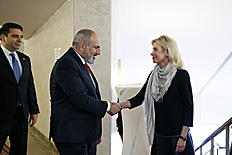 1670x1113px - 480 Kb
1670x1113px - 480 Kb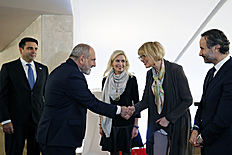 1670x1113px - 489 Kb
1670x1113px - 489 Kb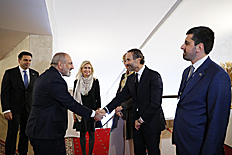 1670x1113px - 500 Kb
1670x1113px - 500 Kb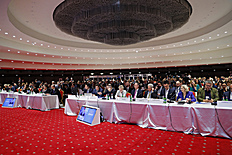 1670x1113px - 985 Kb
1670x1113px - 985 Kb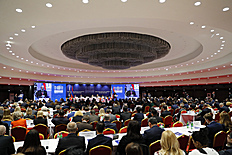 1670x1113px - 844 Kb
1670x1113px - 844 Kb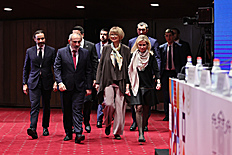 1670x1113px - 764 Kb
1670x1113px - 764 Kb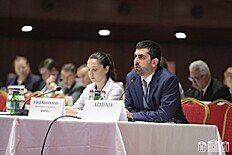 800x534px - 59 Kb
800x534px - 59 Kb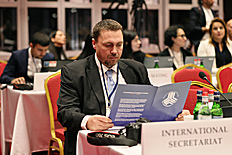 1670x1113px - 692 Kb
1670x1113px - 692 Kb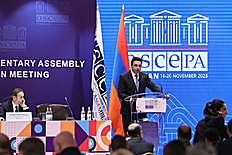 1670x1113px - 1 Mb
1670x1113px - 1 Mb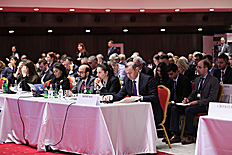 1670x1113px - 742 Kb
1670x1113px - 742 Kb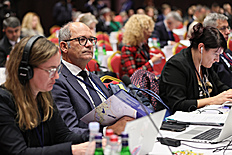 1670x1113px - 730 Kb
1670x1113px - 730 Kb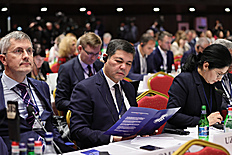 1670x1113px - 735 Kb
1670x1113px - 735 Kb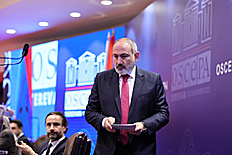 1670x1113px - 636 Kb
1670x1113px - 636 Kb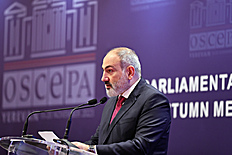 1670x1113px - 687 Kb
1670x1113px - 687 Kb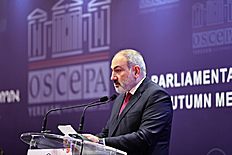 1670x1113px - 673 Kb
1670x1113px - 673 Kb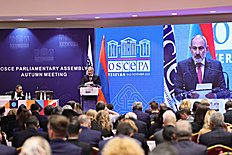 1670x1113px - 1003 Kb
1670x1113px - 1003 Kb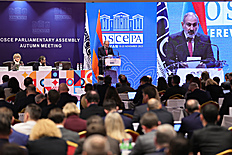 1670x1113px - 1 Mb
1670x1113px - 1 Mb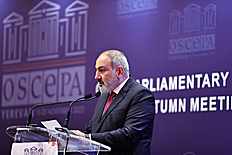 1670x1113px - 630 Kb
1670x1113px - 630 Kb 1670x1113px - 628 Kb
1670x1113px - 628 Kb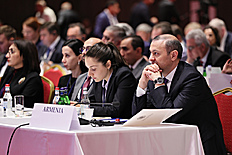 1670x1113px - 648 Kb
1670x1113px - 648 Kb
more 17 photos
Prime Minister Nikol Pashinyan participated in the autumn meeting of the OSCE Parliamentary Assembly and delivered a speech at the Karen Demirchyan Sports and Concert Complex in Yerevan.
In his speech, the Prime Minister, in particular, noted:
"Honorable President of the National Assembly of the Republic of Armenia,
Dear President of the OSCE Parliamentary Assembly,
Madam Secretary General,
Dear Members of Parliament,
Dear attendees,
I welcome the holding of the autumn meeting of the OSCE Parliamentary Assembly in the Republic of Armenia. It takes place at an extremely difficult time, when the world order that has existed in recent decades is showing cracks, showing sure signs of erosion.
It is obvious that the world will not be the same after the crises in Afghanistan, Ukraine, Gaza, ethnic cleansing in Nagorno-Karabakh. No one doubts this anymore. But no one knows what the world will be like tomorrow.
And especially for this reason, it is extremely important that in the time-consuming process of easing of current tensions, managing crises, discussing conflicts, we do not forget to plan the future, because if the future is not planned, crises and conflicts will not find an obstacle to unfold on their way.
Yesterday we failed to build dams to prevent today's floods, therefore, no matter how hard it may be, we must try to build those dams today to manage the possible floods of tomorrow.
The Republic of Armenia is not a global country, but we try to adopt the above-mentioned practices in relation to the issues that are part of our daily agenda and for the solution of which we have a significant share of responsibility.
First of all, I am talking about the Armenia-Azerbaijan peace process. We have both good news and bad news here.
The good news is that the main principles of peace with Azerbaijan have been agreed upon. This happened through the mediation of the President of the European Council, Charles Michel, based on the results of the meetings between the President of Azerbaijan and myself in Brussels. Those agreements were recorded in Charles Michel's statements of May 14 and July 15, based on the results the tripartite meetings.
The first principle of peace is that Armenia and Azerbaijan recognize each other's territorial integrity, with the understanding that the territory of Armenia is 29 thousand 800 square kilometers, the territory of Azerbaijan is 86 thousand 600 square kilometers.
The second principle is for making the first principle concrete, which is as follows. The political basis of border delimitation between Armenia and Azerbaijan is the 1991 Alma-Ata Declaration.
The Alma-Ata Declaration was signed by the 12 republics of the Soviet Union on December 21, 1991. The following two points were recorded in that declaration.
1. The Soviet Union ceases to exist.
2. The 12 Soviet republics, including Armenia and Azerbaijan, recognize each other's territorial integrity, sovereignty, the inviolability of the existing, that is, administrative borders, and therefore the existing administrative borders between the republics of the Soviet Union become state borders.
On this basis, there is a certain understanding between Armenia and Azerbaijan that the maps of the General Staff of the former USSR Armed Forces from 1974 to 1990 should be used for border delimitation.
There is also an understanding that Armenia and Azerbaijan have no territorial claims against each other and are ready to undertake a legal obligation not to bring forward such claims in the future.
It is with this understanding that we propose Azerbaijan not to have troops on either side of the administrative border of the Soviet Union, as well as to address the issues of the exclave/enclaves. For example, the exclave Artsvashen, which is part of the sovereign territory of Armenia, has been under Azerbaijani occupation for more than 30 years.
The next principle of peace with Azerbaijan is as follows: regional communications should be reopened based on the principles of sovereignty, jurisdiction, reciprocity, equality of countries.
This is extremely important, because as the President of the National Assembly mentioned, peace in our view is a state of affairs when all the countries of the region live with open borders, are connected by active economic, political, cultural ties, and have accumulated experience and tradition of solving all issues diplomatically and through dialogue. Achieving this is at least very difficult without having active road, rail, air communications. But that's not all, the countries of the region should be connected with each other by cables, pipelines, power lines.
And here, in order to ensure its share of all this, the Government of the Republic of Armenia puts on the table the "Crossroads of Peace" project, about which a brochure is provided to you, and today we published a video that gives a complete picture of the "Crossroads of Peace".
Dear attendees, these were the good news regarding the peace process with Azerbaijan. And what's the bad news? The most important bad news is that we still speak different diplomatic languages and very often do not understand each other.
Of course, there are also objective reasons for this. the long-standing conflict with a certain historical context, the thousands of victims and the difficulty to look in the eyes of their relatives, the dozens of prisoners whose family members have no answers to their questions, the atmosphere of hatred that has prevailed for decades and suspicions that bad intentions are concealed under constructive statements. Moreover, what I am saying applies to both Armenia and Azerbaijan to a greater or lesser extent. But Azerbaijan, for example, has never made a public reference to the three principles mentioned above, has not reaffirmed its commitment to those principles, which deepens the atmosphere of mistrust.
It also seems extremely suspicious that under the highest patronage in Azerbaijan, and in fact, at the official level, the Republic of Armenia has started to be called "Western Azerbaijan". And this concept is taught in schools, universities, state media. This seems to us a preparation for a new war, a new military aggression against Armenia, and is one of the main obstacles to the progress of the peace process.
We also do not understand Azerbaijan's approach of consistently not returning dozens of captives, despite the fact that we have long proposed to resolve this issue with a formula corresponding to the peace agenda, which is “all for all”.
However, dear attendees, the Republic of Armenia is dedicated to the peace agenda, the peace process, and in my latest speech at the National Assembly of Armenia, I announced that I intend to intensify diplomatic efforts on our part to achieve the signing of a peace treaty with Azerbaijan.
Honorable President of the National Assembly of the Republic of Armenia,
Honorable President of the OSCE Parliamentary Assembly,
Madam Secretary General, dear MPs,
Dear attendees,
We are also in dialogue with Turkey. We have never had such an active dialogue before, although we have not yet had any success in terms of establishing diplomatic relations. But the normalization of Armenia's relations with Turkey is an important factor for the strategic vision of a peaceful, developing and safe environment in our region, the South Caucasus. In the near future, we hope to hear the news of opening the Armenia-Turkey border to citizens of third countries and holders of diplomatic passports, and this will be a big symbolic step.
We hope to make the South Caucasus a region that delivers good news to the world, and the Republic of Armenia and myself are personally ready to bear our share of responsibility for achieving this goal.
I wish success to the Yerevan meeting of the OSCE Parliamentary Assembly.
Thank you for attention."